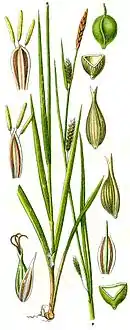| Carex laevigata | |
|---|---|
 | |
| Scientific classification | |
| Kingdom: | Plantae |
| Clade: | Tracheophytes |
| Clade: | Angiosperms |
| Clade: | Monocots |
| Clade: | Commelinids |
| Order: | Poales |
| Family: | Cyperaceae |
| Genus: | Carex |
| Section: | Carex sect. Spirostachyae |
| Species: | C. laevigata |
| Binomial name | |
| Carex laevigata | |
Carex laevigata, the smooth-stalked sedge,[1] is a species of sedge. It lives in moist, shady environment in the lowlands of Western and Central Europe, particularly in alder–ash woodland.[2] It is distinguished from similar species, such as C. binervis and C. distans by the presence of tiny red dots on the utricles.[2] Carex laevigata was first described by James Edward Smith in 1800, in a paper in the journal Transactions of the Linnean Society of London.[3]
References
- ↑ BSBI List 2007 (xls). Botanical Society of Britain and Ireland. Archived from the original (xls) on 2015-06-26. Retrieved 2014-10-17.
- 1 2 A. C. Jermy; D. A. Simpson; M. J. Y. Foley; M. S. Porter (2007). "Carex laevigata Sm.". Sedges of the British Isles. BSBI Handbook No. 1 (3rd ed.). Botanical Society of the British Isles. pp. 356–357. ISBN 978-0-901158-35-2.
- ↑ James Edward Smith (1800). "Descriptions of five new British species of Carex". Transactions of the Linnean Society of London. 5 (19): 264–273. doi:10.1111/j.1096-3642.1800.tb00600.x.
External links
- Carl Farmer. "Smooth Sedge, Carex laevigata". West Highland Flora. Archived from the original on 2011-11-04. Retrieved 2011-08-21.
This article is issued from Wikipedia. The text is licensed under Creative Commons - Attribution - Sharealike. Additional terms may apply for the media files.